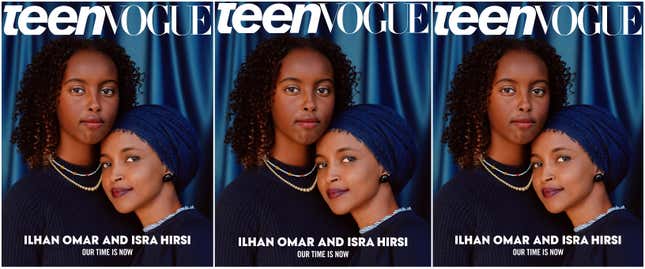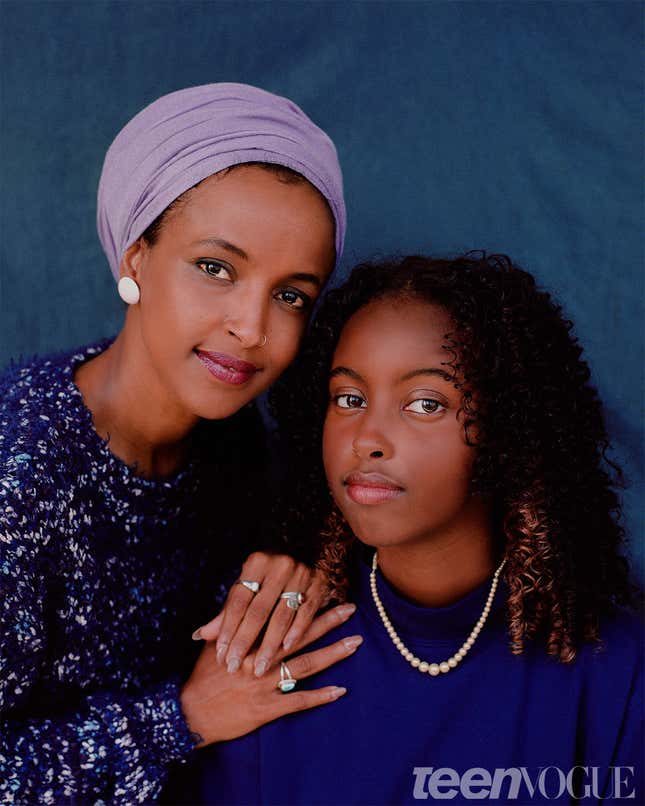
As a Black girl born in Minneapolis, you’d think I’d have closely tracked the ascension of Somali refugee turned American political firebrand Rep. Ilhan Omar (D-Minn.). But as I graduated high school just outside the Twin Cities and made a new life as a college student in New York City, Omar was a new arrival in the “Land of 10,000 Lakes.” In fact, I was sitting in a movie theater for New York City’s Tribeca when I first tuned into Omar’s potential, watching a documentary chronicling the community organizer’s campaign to represent our shared hometown, while balancing family life with her now ex-husband and three children, including eldest daughter Isra.
By the end of 2018, Omar would be elected to the U.S. House of Representatives, a history-making moment in which the hijab-wearing Democrat would both compel the end of an antiquated congressional rule banning headwear on the House floor, and would both stoke the ire and a stream of anti-Muslim, anti-African rhetoric from Trump and his base. Against this and so many other criticisms and threats, Omar would repeatedly maintain a fearless front.
Apparently, it runs in the family. Now poised for reelection after winning her primary by a landslide, Omar and 17-year-old Isra star on the cover of Teen Vogue’s November 2020 issue, which bears the subtitle “Our Time Is Now.”

As it has for the rest of the nation, it’s been a strange time for Omar and her family; the representative’s father, who brought his family to the States and was an ardent supporter of his daughter, died from COVID-19-related complications in June. Months before, Omar’s personal life had come under scrutiny as she remarried in March, this time to a political consultant after becoming a co-defendant in his contentious divorce. And, as both a Minneapolis resident and Minnesota’s representative in the House, the events of May 25 of this year understandably shook her to the core—but as she tells Teen Vogue, her own comfort hasn’t been her concern.
“There are people every single day who are showing up to care for the site of George Floyd’s murder. There are people showing up every single day protesting decades and centuries of brutality,” she says. “And there are people burying not just one but multiple members in their family that have died because of the complications of COVID, so I don’t have the luxury to think about getting, you know, an extra hour of sleep because people are experiencing severe unrest in their lives.”
Omar’s altruism—and outspokenness—has been inherited by her daughter. Isra is already an activist in her own right, having been one of the cofounders of 2019's U.S. Youth Climate Strike. Now, the teenager is focused more on college. Having once fostered aspirations for Harvard, she intends to major in sociology and possibly minor in African or African-American studies in college, possibly becoming a public defender or social worker.
“I have a lot of opportunities that a lot of people don’t, and so recognizing where I fit in this space is the thing that is definitely hard to imagine,” Isra tells Teen Vogue, later adding; “Young people have a very unique ability when it comes to organizing, especially digitally, that a lot of older folks do not understand. Understand that you are important and your voice is too, and don’t let adults especially tell you otherwise.”
With the next election already well in progress, how we use our voices is at the forefront of our current conversation—and the future of our democracy. Nevertheless, Omar urges us not to allow fear to be the foundation of our votes.
“I don’t want us to vote from a place of fear, right? We all understand how harmful Trump’s rhetoric is to all of us, how his policies are harmful to all of us. And how the othering, and the isolation, and the chaos that he brings has really impacted the health and the well-being of many of the people we love and care for. But I also know getting rid of him doesn’t get rid of all of our trauma. And doesn’t get rid of the pain and the harm that has been done to our communities,” she said.
“So I want us to vote from a place of love,” she continued. “And that really, I think, changes the way in which you engage with politics—if you understand that politics is personal. That the politicians who we have in positions of power have the ability to be responsive to you or to be responsive to people who want to cause you harm. And love for ourselves means that we elect people who are going to be responsive to us. And so I am choosing to participate, to organize, to vote, encourage people to vote, because I want us to be able to use our collective power to get people in office that we can hold accountable.”

